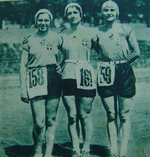| Host city | Florence |
|---|---|
| Country | |
| Dates | 29–31 May 1931 |







The Olympics of Grace (Italian: Olimpiadi della Grazia) was an early international multi-sport event for women that was held from 29–31 May 1931 in Florence, Italy. Primarily composed of track and field events and contested by women from eleven European countries, the competition was a forerunner to women's participation in the European Athletics Championships.
History
The formation of the International Women's Sports Federation (FSFI) and the hosting of the 1921 Women's World Games in Monte Carlo, led by Alice Milliat, marked the growth of organised international women's sport. The Grand Council of Fascism in Italy was partly encouraging of the movement but stated that, regardless of sporting prowess, motherhood was a woman's most important role. Women's engagement in sport fitted the views of Benito Mussolini, the Italian dictator, whose feminine ideal concerned rural, strong and fertile women, in opposition to ostentation and cosmopolitanism. Still, reflecting the social background of emphasising femininity over pure athleticism for women, the 1931 sporting event was designated the Olympics of Grace. International promotional material around the event stressed it "will be devoted not to contests of speed, strength or skill, but to exhibitions of gymnastic grace".
The tournament was supported by Italian women's sports organisations as well as the FSFI. It was not sanctioned by the International Olympic Committee (IOC). Both this event and the Women's World Games led to greater inclusion of women at the Olympic Games. The number of Olympic women athletes increased over five-fold from the 1920 to the 1936 Summer Olympics (65 to 331).
In addition to the track and field events, a dancing competition was held and the winner's cup was presented to a troupe of German dancers under the tutelage of Mary Wigman, one of the originators of modern expressionist dance. It is not known what other events were held in Florence besides dance and athletics.
Medal summary
Athletics
Participation
Eleven European countries competed at the Olympics of Grace. Final standings.
| Team | Nation | Points |
|---|---|---|
| 1 | 77 | |
| 2 | 71 | |
| 3 | 54 | |
| 4 | 35 | |
| 5 | 22 | |
| 5 | 22 | |
| 6 | 17,5 | |
| 7 | 16 | |
| 8 | 10,5 | |
| 9 | 6 | |
| 9 | 6 |
References
- "Le Olimpiadi della Grazia" (PDF). FIDAL. Retrieved 15 June 2021.
- ^ Le Olimpiadi della Grazia (seconda parte) FIDAL (Federazione Italiana di Atletica Leggera) (accessdate 15 June 2021)
- Olympiad of Grace. GBR Athletics. Retrieved on 2014-01-11.
- Gori, Gigliola (2004). Italian Fascism and the Female Body: Sport, Submissive Women and Strong Mothers (pg. 154). Routledge. 978-0714682914.
- Lo Sport (in Italian). La Donna nel Fascismo. Retrieved on 2014-01-11.
- Rizzoli, Biancamaria (2012-09-12). Il costume e la moda. (in Italian). Moda Arte. Retrieved on 2014-01-11.
- PHYSICAL EDUCATION AND SPORTING ACTIVITY FOR WOMEN DURING THE FASCIST ERA. Pp. 203-204. Retrieved 2023-02-21.
- Florence Jan. 8, page 17. The San Bernardino County Sun (1931-01-09). Retrieved on 2014-01-11.
- "Olympics of Grace" for Women. The Spokesman-Review (25 January 1931). Retrieved on 2014-01-11.
- Leigh, Mary H.; Bonin, Thérèse M. (1977). "The Pioneering Role Of Madame Alice Milliat and the FSFI in Establishing International Trade and Field Competition for Women" (PDF). Journal of Sport History. 4 (1). North American Society for Sport History: 72–83. Retrieved 3 September 2011.
- Antwerp 1920. IOC. Retrieved on 2014-01-11.
- Berlin 1936. IOC. Retrieved on 2014-01-11.
- Wellesley College. "The Wellesley News" (1932-12-08). The Wellesley News. Book 935. Retrieved on 2014-01-11.
| FSFI Women's World Games | |
|---|---|
| Editions | |
| Related | |